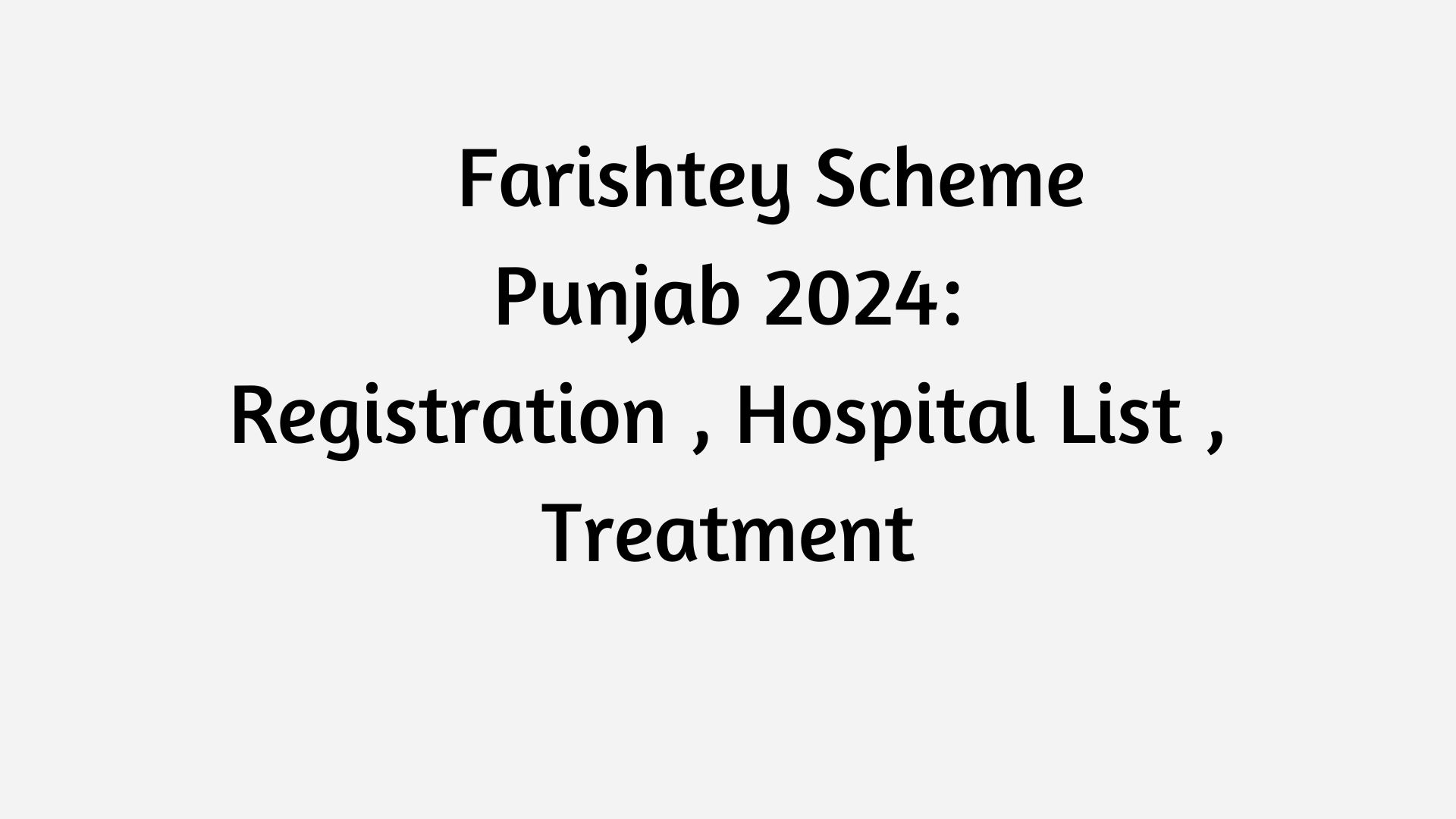The Farishtey Scheme is a ground-breaking healthcare program that the Punjabi government unveiled in 2024 to offer all Punjabi citizens complete medical coverage. This program guarantees that people can obtain high-quality healthcare services without facing financial barriers by emphasizing affordability and accessibility. The registration procedure, the list of hospitals with accreditation, and the therapeutic options offered by the Farishtey Scheme are examined in this article.
Punjab Farishtey Scheme Details Highlights
- Scheme name: The Government of Punjab
- Launched by: The Farishtey Scheme Punjab
- Beneficiaries for Every individual in the state of Punjab
- Objective: supplying state residents impacted by auto accidents with free treatment services
- Benefits: Free medical care in private hospitals in the event of a traffic accident
The objective of Farishtey Scheme Punjab
The principal aim of the Farishtey Scheme Punjab is to provide patients who have been involved in a traffic accident with necessary medical attention. Both governmental and private hospitals are registered under this program to aid the victims. Private hospitals will receive payment under the program for their bills, which will be reimbursed at government-set rates. Under the Ayushman Bharat Sehat Bima Yojana, private hospital costs are comparable to those of the Farishtey Scheme 2024. This has a finalized tariff list with 52 packages for treating accident victims. All residents of the state will receive the same benefits from this program, irrespective of their nationality, caste, or financial situation. In addition, free medical care will be available to all victims of traffic accidents at all surrounding hospitals, including private ones.
Registration Procedure:
Permanent residence in Punjab is a requirement for eligibility. family living below the poverty line (BPL). not signed up for any other health insurance plans.
- Channels of Registration: The Farishtey Scheme website has an online registration gateway where qualified people can sign up by submitting the required information and paperwork.
- Enrollment Camps: To make online registration easier for people who might have trouble accessing it, Punjab periodically organizes enrollment camps.
- Selected Locations: Specific government agencies and medical facilities are designated locations where candidates can register for the Farishtey Scheme in person and turn in their information.
- Documents Required: Identification issued by the government, such as a voter ID or Aadhaar card, serves as proof of identity. Records attesting to one’s residency in Punjab. Proof that a family is below the poverty line is provided by a BPL certificate.
- The size of a passport Photos: Visit the specified enrollment facility or the Farishtey Scheme website. Enter your family’s and your exact personal information on the registration form. To ensure verification, upload or submit the necessary papers. Wait for an SMS or email confirmation of your registration. After registering successfully, you will receive a unique identification number (UIN) for your records.
Enumerated Hospitals:
To offer beneficiaries high-quality medical care, the Farishtey Scheme has partnered with a large number of hospitals and healthcare facilities throughout Punjab. The accredited hospitals provide a comprehensive range of medical services and follow the scheme’s rules. The Farishtey Scheme website or the helpline can be used to obtain the list of hospitals that have been empaneled, which is updated regularly. The following important hospitals are among those on the endorsed list:
- Government hospitals and medical colleges: These establishments offer full healthcare services and are furnished with cutting-edge medical staff and equipment.
- District Hospitals: Providing an extensive array of medical services and amenities, district hospitals function as the principal healthcare hubs in multiple districts of Punjab.
- Private Hospitals and Care Facilities: Numerous esteemed private hospitals and care facilities have collaborated with the Farishtey Scheme to provide their services to the beneficiaries, guaranteeing equitable access to high-quality healthcare regardless of their financial situation.
- Primary health centers (PHCs) and community health centers (CHCs) are essential healthcare institutions that offer primary and preventive healthcare services to rural populations. Access to healthcare is improved in rural locations through CHC and PHC empanelment.
Treatment Facilities under the Farishtey Scheme:
Inpatient Services:
- Hospitalization Expenses: The plan pays for hospital stays that involve the cost of lodging, surgery, medicine, and other supplies.
- Surgical Treatments: A range of surgical operations, both large and minor, are covered under the plan.
- Maternity services include prenatal care, delivery costs, and postpartum care for expectant mothers.
Outpatient Services:
- Consultation Fees: At no additional expense to beneficiaries, physicians and specialists with whom they have an affiliation can provide consultation services.
- Diagnostic tests: Costs associated with tests such as ultrasounds, blood tests, and X-rays are reimbursed.
- Prescription drugs: Free prescription drugs are given for outpatient therapy.
Medical Services
- Emergency Ambulance Services: During crises, ambulance services are offered to transfer patients to the closest medical facility.
- Emergency Room Care: The plan provides for immediate medical attention as well as any necessary procedures.
Specialized medical care
- Chronic Disease Management: This section covers the diagnosis, treatment, and management of chronic conditions like asthma, diabetes, and high blood pressure.
- Treatment for Cancer: Services for cancer support, chemotherapy, radiation therapy, and screening are offered.
- Organ Transplantation: The program pays for the costs of surgical procedures and post-operative care for organ transplant recipients.
Telemedicine Facilities:
- Teleconsultation Services: For non-emergency medical issues, beneficiaries can have remote consultations with medical professionals using telemedicine platforms.
- Tele-diagnostic: Telemedicine enables remote diagnosis and the interpretation of medical information, guaranteeing prompt medical attention.
Conclusion:
The government’s dedication to guaranteeing its residents’ access to healthcare and financial security is best demonstrated by the Farishtey Scheme in Punjab. Improved health outcomes and less financial strain on disadvantaged populations are the goals of the program, which is implemented by simplifying the registration procedure, integrating a large network of institutions, and providing complete treatment facilities. With successful execution and ongoing backing, the Farishtey Scheme can revolutionize Punjab’s healthcare system and guarantee that all people, regardless of their financial situation, receive the treatment they are entitled to.

